Over an eight-day period in April 2024, a barrage of news stories featuring rumors about Kazakhstan’s foreign policy permeated Chinese media. These dubious reports alleged that the U.S. had hyped an unverified leak from a Russian Duma official claiming Kazakhstan was engaged in covert negotiations to join NATO and suggested that Kazakhstan was seeking China’s support to deter a potential Russian invasion.
The series of articles highlights the “fog of war” that pervades not only the battlefields of Ukraine but also the media landscape, representing a new front where Kazakhstan risks becoming collateral damage. Kazakhstan’s president has not deviated from the country’s neutrality and has maintained a difficult yet strategic multi-vector foreign policy that seeks to diversify economic and security arrangements rather than aligning exclusively with one partner. The evident information war underscores the diplomatic sensitivities which Kazakhstan faces, and the sinister tactics employed by outside actors to disrupt domestic and regional balances.
Misleading narrative #1: The U.S. is hyping an alleged voice recording of an official claiming that Kazakhstan is Russia’s next target
On April 6, an alleged audio recording, attributed to Russian State Duma deputy and General Andrei Gurulov, hinted that Kazakhstan was set to become Russia’s next target. The leak surfaced on X (Twitter) and was reported by the New Voice of Ukraine just hours later. In the following two days, the story propagated across at least five Chinese platforms, with numerous reposts claiming that “the Western media has vigorously hyped…the recording scandal”.
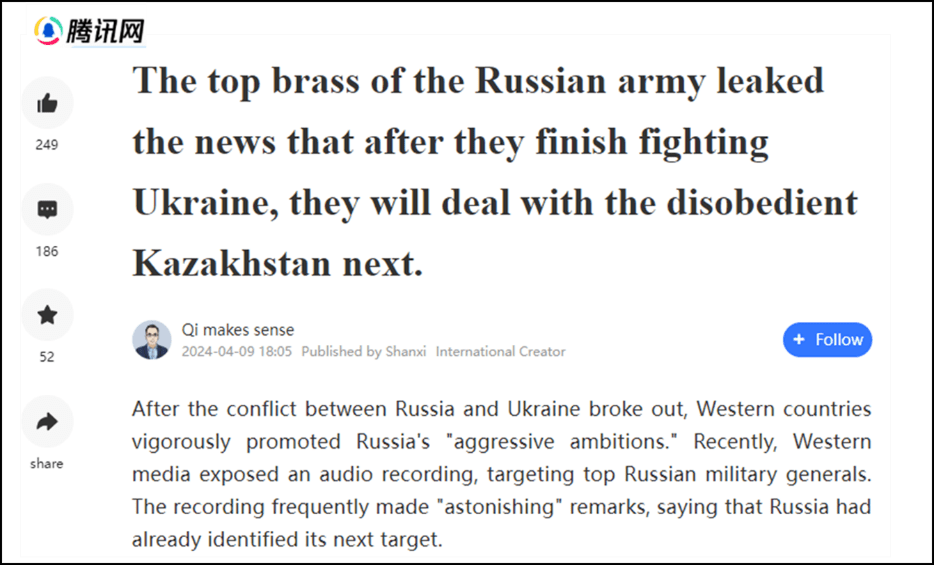
The above post is machine translated from Chinese into English
A search on Google News on 21 April 2024 for “Andrei Gurulov” yielded no results, while a wider search revealed a single defense blog reporting on the alleged leak.
Misleading narrative #2: Kazakhstan is in covert discussions to join NATO
Between April 10 and April 11, an array of articles and blogs appeared on at least six Chinese language media platforms (and were reposted across numerous other outlets) about Kazakhstan’s intent to join the North Atlantic Treaty Organization (NATO). The so-called “news” was based on an unverified and unconfirmed rumor.
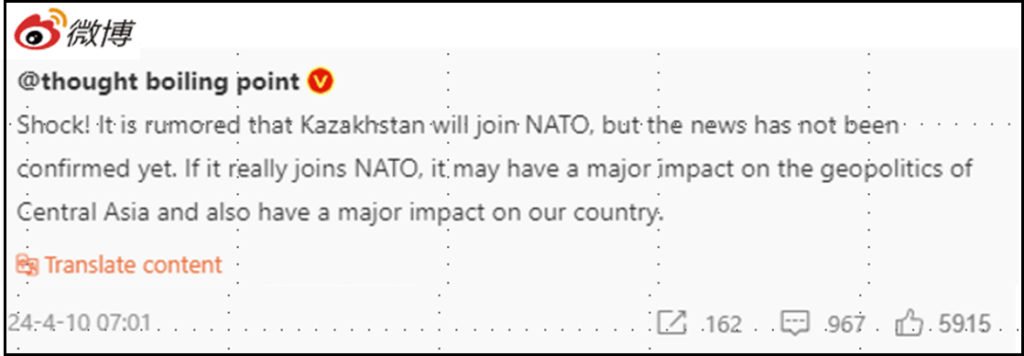
The above post is machine translated from Chinese into English
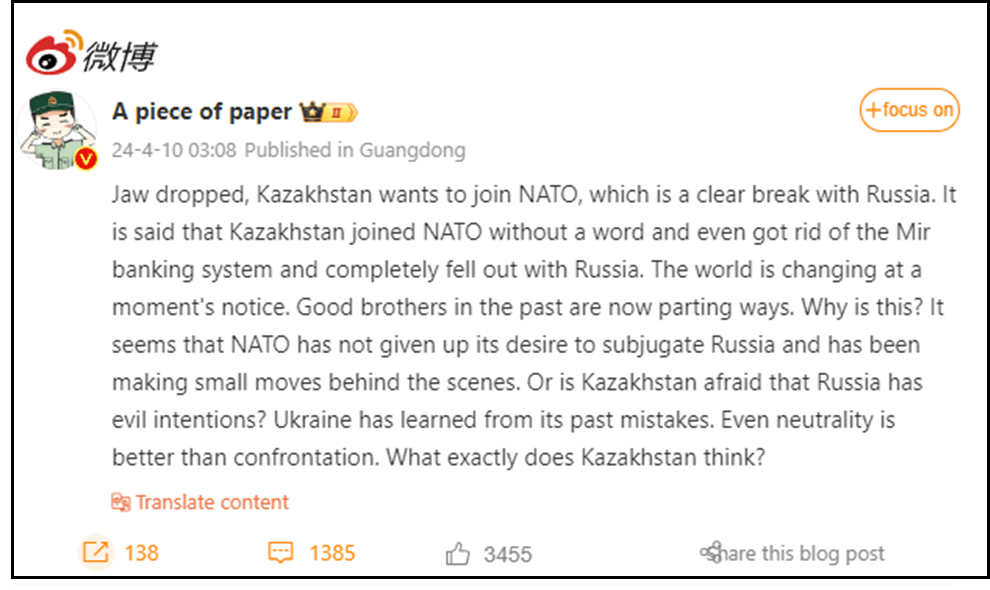
The above post is machine translated from Chinese into English
Kazakhstan has not expressed an intention to join NATO as a full member. Instead, it has engaged with NATO through partnership programs and dialogue, focusing on security cooperation, counter-terrorism, and military training within frameworks like the Partnership for Peace (PfP) program, which Kazakhstan joined in 1995.
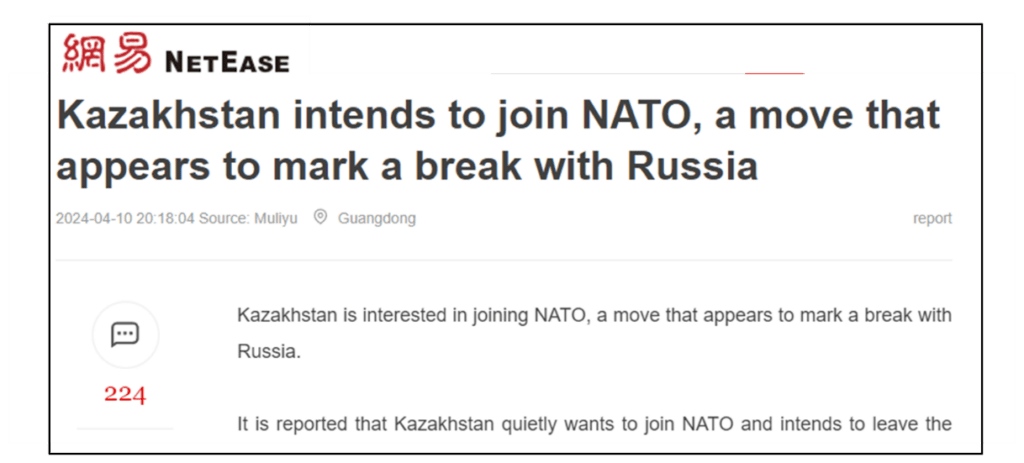
The above post is machine translated from Chinese into English
This is not the first case of gaslighting by the media on Kazakhstan-NATO issues. Images taken from the 2023 opening of a conference hall at the Peacekeeping Operations Center of the Ministry of Defense of Kazakhstan, which was attended by the U.S. Ambassador to Kazakhstan, resulted in similarly bizarre misrepresentations.
Misleading narrative #3: Kazakhstan seeks China’s security to counterbalance the Russian threat
On April 14 and April 15, the latest barrage of messaging set China as Kazakhstan’s preferred guarantor to protect it from the threat of Russian aggression. This story presents the Russian threat to Kazakhstan through references to the Gurulov audio recording and the “defense blog” mentioned above, as well as to the former Kazakhstan President Nazarbayev’s relationship with Russian President Putin. Although the article downplayed the Russian threat, it went to great lengths to depict a strained relationship between Kazakhstan and its northern neighbor.
The postings spotlight Kazakhstan’s collaboration with the U.S. over counter-terrorism efforts and its pursuit of the trans-Caspian Middle Corridor project connecting to the China-led Belt and Road Initiative, which circumvents Russia.
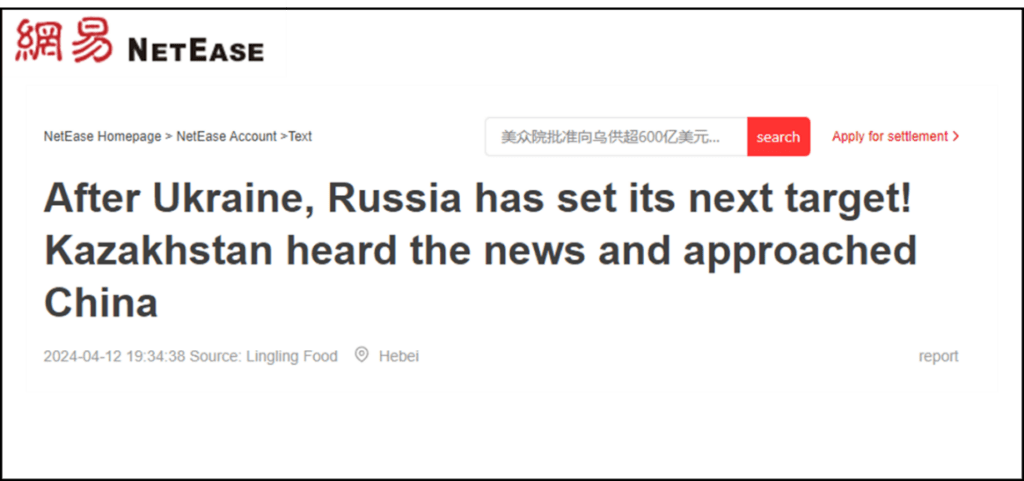
The above post is machine translated from Chinese into English
Making the case for deepened Chinese security cooperation, these posts highlight a long-scheduled Shanghai Cooperation Organization (SCO) meeting Astana that convened in April 2024, where Kazakhstan’s Secretary to the Security Council discussed and signed a protocol agreeing to enhance regional stability and safety with China. Given that eight other SCO member countries also discussed and signed said protocol, deducting from this occasion the conclusion Kazakhstan is approaching China for security guarantees would be a gross overreach.
Nonetheless, the story appeared multiple times on at least four Chinese platforms.
The apparent aim of the campaign
It is not clear if the above-listed misleading story lines were a coordinated attempt. The motivation behind their dissemination is likewise not apparent. However, there are several conceivable outcomes such a campaign would seek to achieve. The articles could aim to evoke concerns between rivaling states and the communities they represent. These false representations could include:
1) Kazakhstan has abandoned its neutrality and is building alliances with NATO and/or China; and
2) Kazakhstan’s leadership is jeopardizing the security of its people by provoking a conflict with Russia.
These articles could have been created by a state actor aiming to influence Kazakhstan’s government to alter its diplomatic stance towards the U.S., China or Russia. They could have also been placed by private Kazakhstani actors intent on making political gains by presenting Kazakhstan’s leadership as unhinged in its diplomatic engagement and thereby undermining the security of the country’s people.
While it should not be ruled out that the articles were placed in Chinese media to specifically target a Chinese audience, the reason behind this choice of placement may also have to do with obfuscating the original source of misinformation.
In any circumstance, this case serves to remind world audiences once again that purported news pertaining to any country’s relationship with Russia, China or the U.S. should be viewed with extreme prejudice and caution in the current geopolitical environment.



